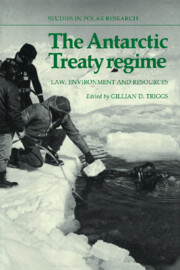Book contents
- Frontmatter
- Contents
- List of contributors
- List of Antarctic Treaty Parties
- Foreword
- Introduction
- Frontispiece: Map of national claims
- Part I Antarctica: physical environment and scientific research
- Part II The Antarctic Treaty regime: legal issues
- Part III The Antarctic Treaty regime: protecting the marine environment
- Part IV The Antarctic Treaty regime: minerals regulation
- 14 Introduction
- 15 Antarctic mineral resources: negotiations for a mineral resources regime
- 16 Mineral resources: commercial prospects for Antarctic minerals
- 17 Negotiation of a minerals regime
- Part V Whither Antarctica? Future policies
- Part VI Conclusion
- Selected reading
- Appendix 1
- Appendix 2
15 - Antarctic mineral resources: negotiations for a mineral resources regime
Published online by Cambridge University Press: 20 January 2010
- Frontmatter
- Contents
- List of contributors
- List of Antarctic Treaty Parties
- Foreword
- Introduction
- Frontispiece: Map of national claims
- Part I Antarctica: physical environment and scientific research
- Part II The Antarctic Treaty regime: legal issues
- Part III The Antarctic Treaty regime: protecting the marine environment
- Part IV The Antarctic Treaty regime: minerals regulation
- 14 Introduction
- 15 Antarctic mineral resources: negotiations for a mineral resources regime
- 16 Mineral resources: commercial prospects for Antarctic minerals
- 17 Negotiation of a minerals regime
- Part V Whither Antarctica? Future policies
- Part VI Conclusion
- Selected reading
- Appendix 1
- Appendix 2
Summary
Introduction
Public interest in Antarctica is probably greater now than for many years, and seems likely to grow. Much of this interest is due, directly or indirectly, to the intergovernmental negotiations in which participating states are seeking to reach agreement upon a regime to govern the possible future search for and development of Antarctic minerals – negotiations which began formally in 1982, but for which the groundwork had been laid over the previous decade. These negotiations are still continuing. Add to this the potential economic significance of the subject-matter of the negotiations, the appeal of Antarctica and its capacity to stir the imagination, and speculation about untold wealth lying below the ice, and it is not hard to see why public interest is aroused.
The Antarctic minerals negotiations must, however, be set in a slightly different, and less glamorous, perspective. The realities can, perhaps, best be appreciated by posing, and then trying to answer, some basic questions:
i) What minerals?
ii) Why try to negotiate a regime now?
iii) Why does a regime have to be negotiated?
iv) Why should the Antarctic Treaty Consultative Parties be conducting negotiations?
v) What are the real problems?
vi) What are the answers?
What minerals?
In the present state of knowledge, speculation about untold mineral wealth in Antarctica, of an ‘El Dorado of the ice’, is no more than that – speculation. That cannot be emphasised too strongly, or repeated too often. The geology of Antarctica is something best left to others, but very much in laymen's terms, and in summary, such geological evidence as there is suggests that mineral deposits could well exist in Antarctica.
- Type
- Chapter
- Information
- The Antarctic Treaty RegimeLaw, Environment and Resources, pp. 164 - 175Publisher: Cambridge University PressPrint publication year: 1987
- 1
- Cited by

